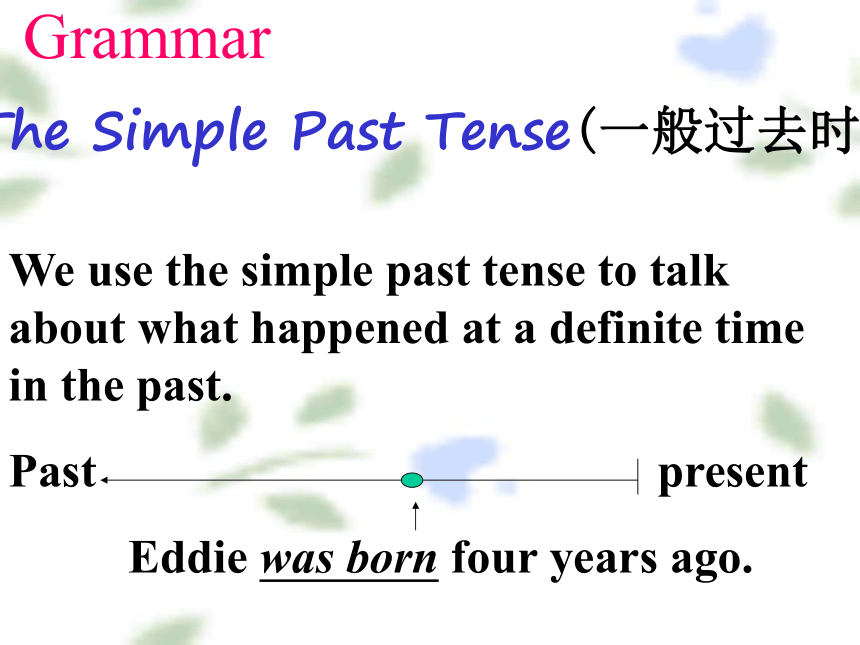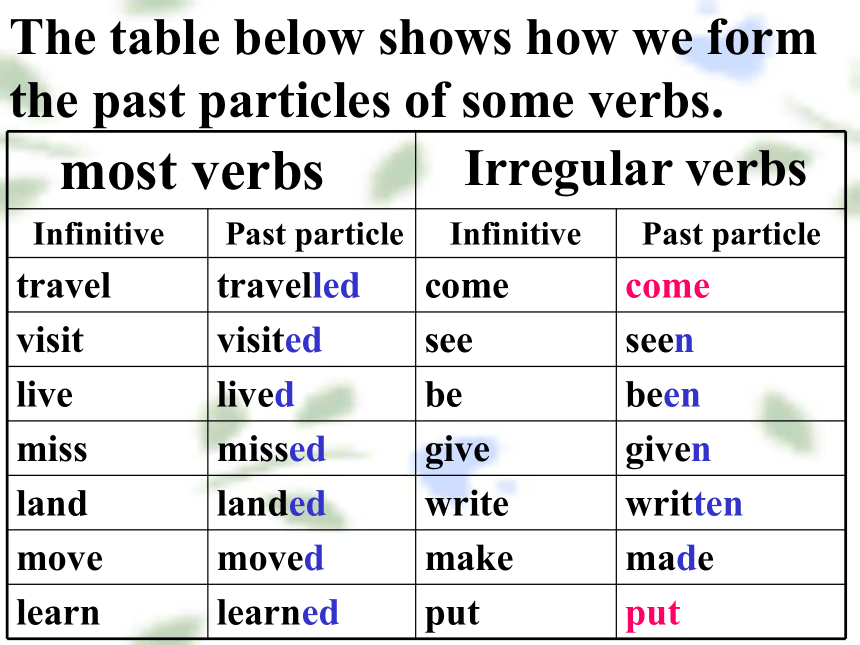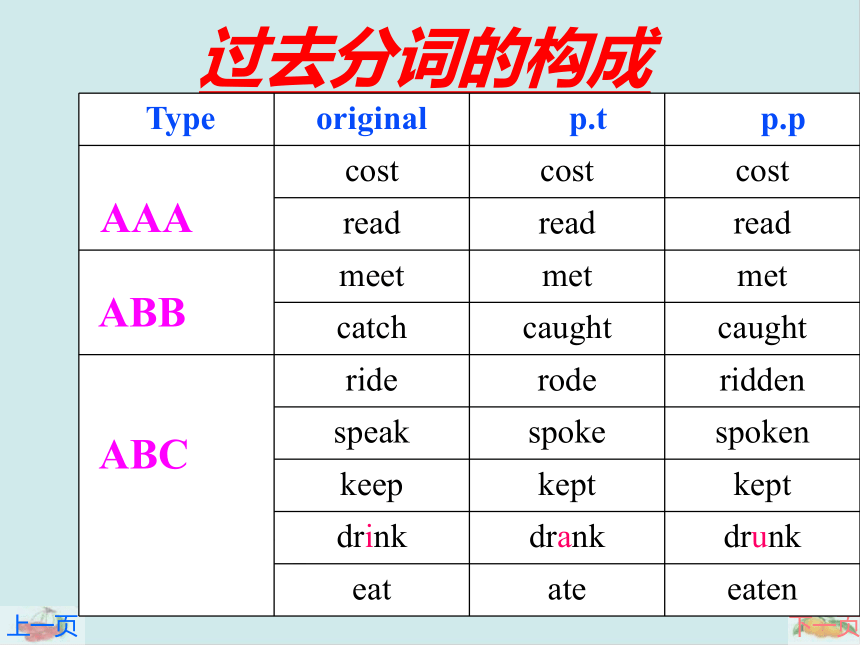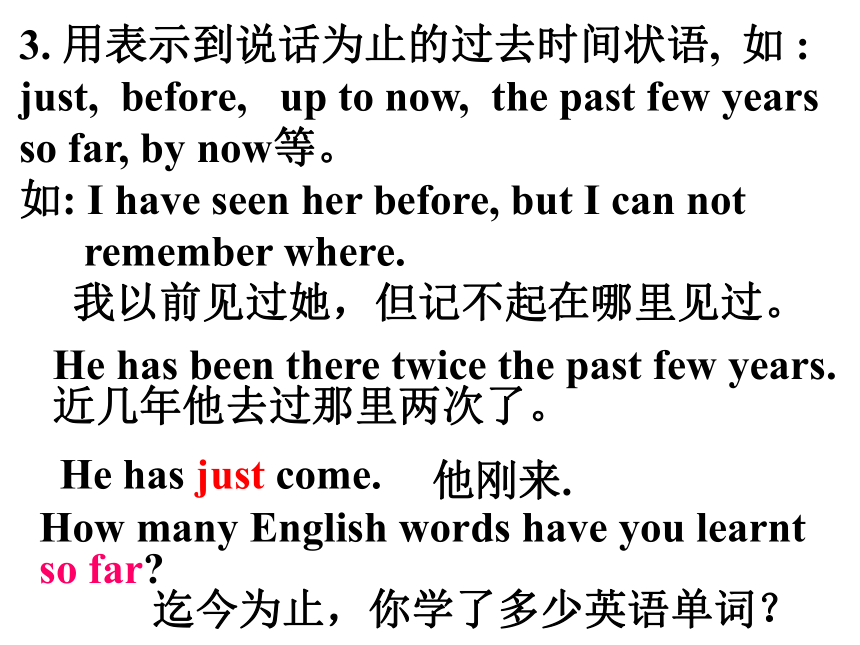8B Unit1 Past and present Grammar 课件
文档属性
| 名称 | 8B Unit1 Past and present Grammar 课件 |  | |
| 格式 | zip | ||
| 文件大小 | 331.5KB | ||
| 资源类型 | 教案 | ||
| 版本资源 | 牛津译林版 | ||
| 科目 | 英语 | ||
| 更新时间 | 2013-02-06 15:26:34 | ||
图片预览












文档简介
课件38张PPT。GrammarWe use the simple past tense to talk about what happened at a definite time in the past.
Past present
Eddie was born four years ago.The Simple Past Tense(一般过去时 )现在完成时
1.过去发生的动作对现在造成的影响或结果。2.过去已经开始,持续到现在的动作或状态动词构成:have/has+v过去分词have breakfastI have just had my breakfast.(现在我不饿)I’m not hungry nowmoved here
in 2008I still live hereI have lived here for three years.I have lived here since 2008/three years ago.一、现在完成时的构成 1现在完成时的肯定句 句型 主语(第一、二人称单、复数)+have 主语(第三人称复数) +have +过去分词 主语(第三人称单数) +has We have lived in Beijing.
He has lived in Beijing.
I have finished my homework.2现在完成时的否定句
句型 主语+have/has+not+过去分词+……
I have not seen the movie yet.
He hasn’t been to Beijing since thenHave you….? Has he….?
Yes, I have Yes, he has.
No, I haven’t. No, he hasn’t .has not = hasn’t have not= haven’t3现在完成时的一般疑问句
句型 Have/Has+主语+过去分词+….
Have you finished the work?
Has she arrived here?
4现在完成时的特殊疑问句
句型 特殊疑问词+have/has+主语+过去分词+…….
How many times have you been to the Great Wall?规则动词的变化 Regular verbsplayedhurrieddroppedlived不规则动词的变化 Irregular verbs
(见书后不规则动词变化表 )The table below shows how we form the past particles of some verbs.
过去分词的构成上一页下一页ABBAAA ABC二、现在完成时的用法A.表示过去发生或已经完成的动作,其后果和影响现在仍然存在。把过去的动作和现在的结果联系起来,此时句中可不用任何时间状语,也可用不确定时间的副词already, ever, never, yet, just, before, once, always, often等,
例如:
1.We have just seen the TV play.
2.She has already copied the new words.
3. He has just found his library book.
4. Have you got a pencil sharpener?
Yes,I have. No,I haven` t. 5. Has she travelled on a plane?
Yes,she has. No,never. 6. Have they ever been abroad?
Yes,they have. No,not even once.现在完成时的时间副词和时间短语:1. 副词already和yet。already一般用于肯定句中,yet一般用于否定句和 疑问句中。
We have already finished our homework.
我们已完成作业了。 Have you finished your homework yet?
Not yet.你已经完成家庭作业了吗? - I have never been to the Great Wall.
我从未去过长城。2.副词ever 和never。多用于否定或疑问
句中,表示“曾经”或“从未“等。?
如: - Have you ever been to the Great
Wall?
你曾经去过长城吗?He has been there twice the past few years.
近几年他去过那里两次了。3. 用表示到说话为止的过去时间状语, 如 : just, before, up to now, the past few years
so far, by now等。
如: I have seen her before, but I can not
remember where. ? 我以前见过她,但记不起在哪里见过。他刚来.He has just come.How many English words have you learnt so far?迄今为止,你学了多少英语单词?B.表示过去已经开始,持续到现在的动作或状态,可以和表示从过去某一时刻开始, 一直延续到现在(包括现在在内,也许还要继续进行下去)的(段)时间状语连用。共有以下几种情况:与
for + 表示一段时间的词组连用;
since + 表示过去的时间点或从句连用。
例如:
1.我做教师已有二十年了。
2.她在这家工厂工作十年了。
3.她自从去年九月起就在这所学校。
4.自从三年前他就住在伦敦。 I've been a teacher for twenty years.She's worked in the factory for ten years. She's been at this school since last September.He‘s lived in London since three years ago.常见的短暂性动词和延续性动词的转换如下: 非延续性动词 → 可延续性动词 come be here/ be in die be dead
borrow keep join be a +….(成员.member )/be in+组织 buy have leave be away
begin be on
finish be over
leave be away注意:在上述句型的肯定句中,不可用短暂性动词(表示
动作短暂不能延续的动词)作谓语,而应改为相应的
延续性动词。如:他已到达。 He has arrived.
他已到达四天。He has been here for four days.
或 He arrived here four days ago. 延续动词与瞬间动词
用于完成时的区别:
延续动词表示经验,经历;瞬间动词表示行为的结果,不能与时段连用
He has finished the work.他已完成了那项工作。 (表结果)
I've known him since then.我从那时起就认识他了。(表经历)
I have come here for two years.
She has bought the bike for half a year.
Have you borrowed the book for three weeks? 延续动词与瞬间动词 注意事项:
1.在“从过去持续到现在”用法中,谓语动词通常是延续性动词,live, work, teach, study, be, know, keep, learn等
Mary has been in Beijing for 2 years.
2.非延续性(短暂性)动词与一段时间状语连用时,仅用于否定结构,它表示的动作并未发生,实际是一种状态。
I haven’t seen you for a long time.
She hasn’t left home since 1992.
如非延续性动词典需和一段时间连用时,则须将其换成相应的表示延续性动词。 1.他已经来了。 2.他来这儿/北京有两个月了。 .
3.这位老人已经逝世。 4.这位老人已经逝世一年多了。
5.李雷已经从图书馆借了这本书。
6.李雷从图书馆借这本书一周了。
7. 凯特已经买了一辆自行车。 凯特买了这辆自行车已经两周了。
8. 火车已经离开了。 火车离开很久了。 He has come.He has been here (in Beijing) for 2 monthsThis old man has died.This old man has been dead for over one year.Li Lei has borrowed the book from the school library.Li Lei has kept the book from the school library for a week. Kate has bought a bike.Kate has had the bike for two weeks.The train has left.The train has been away for a long time.改写下列各句:
1.His uncle died 2 years ago.
2.Her mother has been a party member for 3 years.
3.He left here two days ago.
4.He has been a worker for 3 years.
5.I have taught French in this school for 2years.His uncle has been dead for 2years. His uncle has been dead since 2 years ago.Her mother joined the party 3years ago.Her mother has been a party member since 3years agoHe has been away from here for 2 days.He has been away from here since 2 days ago.He has been a worker since 3 years ago.He became a worker 3 years ago.I began to teach in this 2 years ago.以上的句子都可以改为“It is +时间段 +since+一般过去时态的句子:1.His uncle died 2 years ago.
2.Her mother has been a party member for 3 years.
3.He left here two days ago.
4.He has been a worker for 3 years.
5.I have taught French in this school for 2years.It is 2 years since his uncle died.It is 3 years since her mother joined the party.It is two days since he left here.It is 3 years since he became a worker.It is 2 years since I began to teach French in this school.(C)现在完成时还常与句型 This is the first time… It’s the first time … 连用。eg:1.This is the first time he has driven a car .这是他第一次开车。(D)现在完成时和最高级连用表示到现在为止是最…的。What a boring film!It’s the most boring film I’ve ever seen.一部多么令人厌烦的电影啊!这是我看过的最令人厌烦的电影。Making sentences
Mr.Wu asks the students to complete the sentences below using the present perfect tense.Help them complete the sentences.
They______________(finish) their homework.
Mr. And Mrs.Li _________________(not come) back yet.
John___________ (play) this computer game a few times.
We _______________ (not see)that film yet
Mr Dong _______________ (repair) over ten bikes since last Friday.
You _________________ (not visit)me for a long time.have finishedhave not comehas playedhave not seenhas repairedhave not visitedPractice1.Who has already been to Japan?
2.Who has never been to Japan?
3.Who has just been to Japan?
4.Who has already been to Britain?
5.Who has not been to Britain yet?
6.Who has not been to Hawaii yet?
7.Who has just been to Hawaii?
8.Who has already been to Hawaii?Ask and answer 表示曾去过某处have / has been的用法以及它们在疑问句、否定句中与ever、never连用。
例如: We have been to Qingdao . 我们去过青岛。 She has been to Sanya. 她去过三亚。
been to 与gone to表示某人去某处(还没有回来)用have / has gone,
例如:
Who has gone to Beijing? 谁去了北京? Her mother has gone to Hawaii.
她妈妈去了夏威夷了。have been (to)和have gone (to)的区别: have / has been (to) 表示“曾经去过”某地, 说话时此人很可能
不在那里, 已经回来. 侧重指经历。have / has gone (to) 表示某人“已经去了”某地, 说话时此人
在那里,或可能在路上, 反正不在这里。have / has been (in) 表示“来/去某地(多长时间)”, 现在仍在
那儿,强调状态。 He has been to Beijing (twice). 他曾去过北京(两次).
He has gone to Beijing. 他已经去了北京.
He has been in Beijing for three weeks. 他已经来/去北京三个
周了。1.你去过长城吗
2. 他爸爸去了广州了。
3.你爸爸去过颐和园吗?
4.我们从来没有去过北海公园。
5.李雷在哪儿?他到图书馆去了。
6.他从来没有去过大连。Have you ever been to the Great Wall?Has your father been to the Summer Palace? We have never been to the Beihai Park.He has never been to Dalian.PracticeHis father has gone to Guangzhou. Where is Li Lei? He has gone to the library 7.他在这儿/北京有两个月了。
8. 他父亲已经入党二十多年了。His father has been in the Party for over 20 years.
His father has been a Party member for over 20 years. He has been here (in Beijing) for 2 months. Ask and answer in pairs:
Have you ever……?
If the students have found a person who has done what is stated(做了所问之事), they write a complete sentence,eg.,
Wu Lin has kept a rabbit as a pet.
Wu Han has eaten snacks in class.
Zhou Zhixiao has listened to Jay Chou.
…………….Group CompetitionChat time
Millie and Sandy are talking about an exhibition of the history of Beijing.
M : ______ you ____ (see)any exhibitions recently, Sandy?
S : No, I _______.What about you?
M : Well, I _____________ (see) one.I saw it at the history museum last week.
S : What’s it about?
M : I ______________ (forget) the title.It’s about changes in Beijing over the past century.
Haveseenhaven’thave seenhave forgottenS: Oh,yes.I________(hear)about it.______ your cousin ____ (go) with you?
M : No, he _______.He ________ (be) very busy this week.
S : Did you enjoy the exhibition?
M : Yes, I did.I ______(learn)a lot about Beijing’s past and present and I_______(decide)to see it again.Do you want to go with me?
S : Sure.I won’t miss it this time.
Didgodidn’thas beenlearnthavedecidedhave heardComplete their conversation using the present perfect tense of the verbs in brackets with the correct time expressions.
Simon: Have you_______________ (travel) by plane?
Daniel: No, I________________ ( not travel ) by plane
_______, but I’ll fly to Sanya this summer. My parents and I will stay there for a whole week to enjoy the sun and the beach.
Simon: I’m sure you’ll enjoy the trip. By the way, did you know that my family___________( own) a boat
_______ 1920?ever travelledhaven’t travelledyethas ownedsinceDaniel: I can’t believe your family___________( own) a boat _____________ over 80 years!
Simon: In fact, you ______________( see) it in the sitting room.
Daniel: Oh,yes,but that’s not a real boat. It’s only a model!
Simon: I know, but it looks like a real one. It’s just smaller.
Daniel: I must say that it’s the best model I__________(see ).
Simon: Thank you, Daniel.
has ownedforhave already seenhave ever seen Main points:1. be sureI am sure that you will enjoy the trip.You are sure to win.She is sure about it.They are sure of success2. by the way4.in fact = as a matter of fact3.own-----owner三、现在完成时与一般过去时的比较: 现在完成时态表示过去发生或某一时间发生的动作或
存在的状态。试比较:
He has gone to Shanghai. (强调结果) He went to Shanghai last week. (强调动作) We have already had our breakfast. (吃过了) We had our breakfast at half past six.(吃早饭时间) We have lived here for ten years.(与段时间相连) We moved here ten years ago. (与点时间相连) 对比:
这位老人六年前去逝的。 这位老人已经去逝了。
这位老人已经去世一年了。The old man died six years ago.The old man has died.The old man has been dead for one year.请大家认真分析比较下列各例句:
I saw this film yesterday.
(强调看的动作发生过了。)
I have seen this film.
(强调对现在的影响,电影的内容已经知道了。)
She has returned from Paris.
(她已从巴黎回来了。)
She returned yesterday.
(她是昨天回来了。)
He has been in the League for three years.
(在团内的状态可延续)
He joined the League three years ago.
( 三年前入团,joined为短暂行为。)
注意:句子中如有过去时的时间副词(如 yesterday, last week, in 1960)时,不能使用现在完成时,要用过去时。例如:
(错)Tom has written a letter to his parents last night.
(对)Tom wrote a letter to his parents last night. 动 词 填 空:
1._____ you ________(clean) the room?
Yes, we __________(do) that already.
When _______ you ______(do) it?
We _______(do) it an hour ago.
2.______ he ______(see) this film yet? Yes.
When _____ he _____(see) it?
He ______ it last week.
3. How many times _____you______(be) there?
Havecleanedhave donediddodidHasseendidseesawhavebeen下一页上一页4. I __________ (read) the novel twice. It’s interesting.
5. She _________(go) to Pairs, hasn’t she? Yes.
How ______ she _______(go) there?
She _______(go) there by air.
6. So far, many countries _______________(develop)
their software programs.
7.Mr Chen ______(give)up smoking last year.
8.Mr chen __________(give) up smoking since last year.
have readhas gonedidgowenthave developedgavehas given下一页上一页1.他在这儿住了十年了.
2.自从离开学校到现在我写过两封信给他.
3.我们家乡发生了巨大变化.
4.我刚刚到这里.他刚才也在这里,但是现在他去图书馆了.
5.自两年前到现在我曾经去过北京两次.
6.他在北京呆了两个月.He has lived here for ten years.I have written to him twice since I left school.Great changes have taken place in our hometown .I have just arrived here. He was here just now. But now he has gone to the library.I have been to Beijing twice since two years ago.He has been in Beijing for two months.7.我上周感冒了.
我从上周以来就感冒了
8.我还没收到他的来信.I caught a cold last week.I have had a cold since last week.I haven’t heard from him yet.See you later!
Past present
Eddie was born four years ago.The Simple Past Tense(一般过去时 )现在完成时
1.过去发生的动作对现在造成的影响或结果。2.过去已经开始,持续到现在的动作或状态动词构成:have/has+v过去分词have breakfastI have just had my breakfast.(现在我不饿)I’m not hungry nowmoved here
in 2008I still live hereI have lived here for three years.I have lived here since 2008/three years ago.一、现在完成时的构成 1现在完成时的肯定句 句型 主语(第一、二人称单、复数)+have 主语(第三人称复数) +have +过去分词 主语(第三人称单数) +has We have lived in Beijing.
He has lived in Beijing.
I have finished my homework.2现在完成时的否定句
句型 主语+have/has+not+过去分词+……
I have not seen the movie yet.
He hasn’t been to Beijing since thenHave you….? Has he….?
Yes, I have Yes, he has.
No, I haven’t. No, he hasn’t .has not = hasn’t have not= haven’t3现在完成时的一般疑问句
句型 Have/Has+主语+过去分词+….
Have you finished the work?
Has she arrived here?
4现在完成时的特殊疑问句
句型 特殊疑问词+have/has+主语+过去分词+…….
How many times have you been to the Great Wall?规则动词的变化 Regular verbsplayedhurrieddroppedlived不规则动词的变化 Irregular verbs
(见书后不规则动词变化表 )The table below shows how we form the past particles of some verbs.
过去分词的构成上一页下一页ABBAAA ABC二、现在完成时的用法A.表示过去发生或已经完成的动作,其后果和影响现在仍然存在。把过去的动作和现在的结果联系起来,此时句中可不用任何时间状语,也可用不确定时间的副词already, ever, never, yet, just, before, once, always, often等,
例如:
1.We have just seen the TV play.
2.She has already copied the new words.
3. He has just found his library book.
4. Have you got a pencil sharpener?
Yes,I have. No,I haven` t. 5. Has she travelled on a plane?
Yes,she has. No,never. 6. Have they ever been abroad?
Yes,they have. No,not even once.现在完成时的时间副词和时间短语:1. 副词already和yet。already一般用于肯定句中,yet一般用于否定句和 疑问句中。
We have already finished our homework.
我们已完成作业了。 Have you finished your homework yet?
Not yet.你已经完成家庭作业了吗? - I have never been to the Great Wall.
我从未去过长城。2.副词ever 和never。多用于否定或疑问
句中,表示“曾经”或“从未“等。?
如: - Have you ever been to the Great
Wall?
你曾经去过长城吗?He has been there twice the past few years.
近几年他去过那里两次了。3. 用表示到说话为止的过去时间状语, 如 : just, before, up to now, the past few years
so far, by now等。
如: I have seen her before, but I can not
remember where. ? 我以前见过她,但记不起在哪里见过。他刚来.He has just come.How many English words have you learnt so far?迄今为止,你学了多少英语单词?B.表示过去已经开始,持续到现在的动作或状态,可以和表示从过去某一时刻开始, 一直延续到现在(包括现在在内,也许还要继续进行下去)的(段)时间状语连用。共有以下几种情况:与
for + 表示一段时间的词组连用;
since + 表示过去的时间点或从句连用。
例如:
1.我做教师已有二十年了。
2.她在这家工厂工作十年了。
3.她自从去年九月起就在这所学校。
4.自从三年前他就住在伦敦。 I've been a teacher for twenty years.She's worked in the factory for ten years. She's been at this school since last September.He‘s lived in London since three years ago.常见的短暂性动词和延续性动词的转换如下: 非延续性动词 → 可延续性动词 come be here/ be in die be dead
borrow keep join be a +….(成员.member )/be in+组织 buy have leave be away
begin be on
finish be over
leave be away注意:在上述句型的肯定句中,不可用短暂性动词(表示
动作短暂不能延续的动词)作谓语,而应改为相应的
延续性动词。如:他已到达。 He has arrived.
他已到达四天。He has been here for four days.
或 He arrived here four days ago. 延续动词与瞬间动词
用于完成时的区别:
延续动词表示经验,经历;瞬间动词表示行为的结果,不能与时段连用
He has finished the work.他已完成了那项工作。 (表结果)
I've known him since then.我从那时起就认识他了。(表经历)
I have come here for two years.
She has bought the bike for half a year.
Have you borrowed the book for three weeks? 延续动词与瞬间动词 注意事项:
1.在“从过去持续到现在”用法中,谓语动词通常是延续性动词,live, work, teach, study, be, know, keep, learn等
Mary has been in Beijing for 2 years.
2.非延续性(短暂性)动词与一段时间状语连用时,仅用于否定结构,它表示的动作并未发生,实际是一种状态。
I haven’t seen you for a long time.
She hasn’t left home since 1992.
如非延续性动词典需和一段时间连用时,则须将其换成相应的表示延续性动词。 1.他已经来了。 2.他来这儿/北京有两个月了。 .
3.这位老人已经逝世。 4.这位老人已经逝世一年多了。
5.李雷已经从图书馆借了这本书。
6.李雷从图书馆借这本书一周了。
7. 凯特已经买了一辆自行车。 凯特买了这辆自行车已经两周了。
8. 火车已经离开了。 火车离开很久了。 He has come.He has been here (in Beijing) for 2 monthsThis old man has died.This old man has been dead for over one year.Li Lei has borrowed the book from the school library.Li Lei has kept the book from the school library for a week. Kate has bought a bike.Kate has had the bike for two weeks.The train has left.The train has been away for a long time.改写下列各句:
1.His uncle died 2 years ago.
2.Her mother has been a party member for 3 years.
3.He left here two days ago.
4.He has been a worker for 3 years.
5.I have taught French in this school for 2years.His uncle has been dead for 2years. His uncle has been dead since 2 years ago.Her mother joined the party 3years ago.Her mother has been a party member since 3years agoHe has been away from here for 2 days.He has been away from here since 2 days ago.He has been a worker since 3 years ago.He became a worker 3 years ago.I began to teach in this 2 years ago.以上的句子都可以改为“It is +时间段 +since+一般过去时态的句子:1.His uncle died 2 years ago.
2.Her mother has been a party member for 3 years.
3.He left here two days ago.
4.He has been a worker for 3 years.
5.I have taught French in this school for 2years.It is 2 years since his uncle died.It is 3 years since her mother joined the party.It is two days since he left here.It is 3 years since he became a worker.It is 2 years since I began to teach French in this school.(C)现在完成时还常与句型 This is the first time… It’s the first time … 连用。eg:1.This is the first time he has driven a car .这是他第一次开车。(D)现在完成时和最高级连用表示到现在为止是最…的。What a boring film!It’s the most boring film I’ve ever seen.一部多么令人厌烦的电影啊!这是我看过的最令人厌烦的电影。Making sentences
Mr.Wu asks the students to complete the sentences below using the present perfect tense.Help them complete the sentences.
They______________(finish) their homework.
Mr. And Mrs.Li _________________(not come) back yet.
John___________ (play) this computer game a few times.
We _______________ (not see)that film yet
Mr Dong _______________ (repair) over ten bikes since last Friday.
You _________________ (not visit)me for a long time.have finishedhave not comehas playedhave not seenhas repairedhave not visitedPractice1.Who has already been to Japan?
2.Who has never been to Japan?
3.Who has just been to Japan?
4.Who has already been to Britain?
5.Who has not been to Britain yet?
6.Who has not been to Hawaii yet?
7.Who has just been to Hawaii?
8.Who has already been to Hawaii?Ask and answer 表示曾去过某处have / has been的用法以及它们在疑问句、否定句中与ever、never连用。
例如: We have been to Qingdao . 我们去过青岛。 She has been to Sanya. 她去过三亚。
been to 与gone to表示某人去某处(还没有回来)用have / has gone,
例如:
Who has gone to Beijing? 谁去了北京? Her mother has gone to Hawaii.
她妈妈去了夏威夷了。have been (to)和have gone (to)的区别: have / has been (to) 表示“曾经去过”某地, 说话时此人很可能
不在那里, 已经回来. 侧重指经历。have / has gone (to) 表示某人“已经去了”某地, 说话时此人
在那里,或可能在路上, 反正不在这里。have / has been (in) 表示“来/去某地(多长时间)”, 现在仍在
那儿,强调状态。 He has been to Beijing (twice). 他曾去过北京(两次).
He has gone to Beijing. 他已经去了北京.
He has been in Beijing for three weeks. 他已经来/去北京三个
周了。1.你去过长城吗
2. 他爸爸去了广州了。
3.你爸爸去过颐和园吗?
4.我们从来没有去过北海公园。
5.李雷在哪儿?他到图书馆去了。
6.他从来没有去过大连。Have you ever been to the Great Wall?Has your father been to the Summer Palace? We have never been to the Beihai Park.He has never been to Dalian.PracticeHis father has gone to Guangzhou. Where is Li Lei? He has gone to the library 7.他在这儿/北京有两个月了。
8. 他父亲已经入党二十多年了。His father has been in the Party for over 20 years.
His father has been a Party member for over 20 years. He has been here (in Beijing) for 2 months. Ask and answer in pairs:
Have you ever……?
If the students have found a person who has done what is stated(做了所问之事), they write a complete sentence,eg.,
Wu Lin has kept a rabbit as a pet.
Wu Han has eaten snacks in class.
Zhou Zhixiao has listened to Jay Chou.
…………….Group CompetitionChat time
Millie and Sandy are talking about an exhibition of the history of Beijing.
M : ______ you ____ (see)any exhibitions recently, Sandy?
S : No, I _______.What about you?
M : Well, I _____________ (see) one.I saw it at the history museum last week.
S : What’s it about?
M : I ______________ (forget) the title.It’s about changes in Beijing over the past century.
Haveseenhaven’thave seenhave forgottenS: Oh,yes.I________(hear)about it.______ your cousin ____ (go) with you?
M : No, he _______.He ________ (be) very busy this week.
S : Did you enjoy the exhibition?
M : Yes, I did.I ______(learn)a lot about Beijing’s past and present and I_______(decide)to see it again.Do you want to go with me?
S : Sure.I won’t miss it this time.
Didgodidn’thas beenlearnthavedecidedhave heardComplete their conversation using the present perfect tense of the verbs in brackets with the correct time expressions.
Simon: Have you_______________ (travel) by plane?
Daniel: No, I________________ ( not travel ) by plane
_______, but I’ll fly to Sanya this summer. My parents and I will stay there for a whole week to enjoy the sun and the beach.
Simon: I’m sure you’ll enjoy the trip. By the way, did you know that my family___________( own) a boat
_______ 1920?ever travelledhaven’t travelledyethas ownedsinceDaniel: I can’t believe your family___________( own) a boat _____________ over 80 years!
Simon: In fact, you ______________( see) it in the sitting room.
Daniel: Oh,yes,but that’s not a real boat. It’s only a model!
Simon: I know, but it looks like a real one. It’s just smaller.
Daniel: I must say that it’s the best model I__________(see ).
Simon: Thank you, Daniel.
has ownedforhave already seenhave ever seen Main points:1. be sureI am sure that you will enjoy the trip.You are sure to win.She is sure about it.They are sure of success2. by the way4.in fact = as a matter of fact3.own-----owner三、现在完成时与一般过去时的比较: 现在完成时态表示过去发生或某一时间发生的动作或
存在的状态。试比较:
He has gone to Shanghai. (强调结果) He went to Shanghai last week. (强调动作) We have already had our breakfast. (吃过了) We had our breakfast at half past six.(吃早饭时间) We have lived here for ten years.(与段时间相连) We moved here ten years ago. (与点时间相连) 对比:
这位老人六年前去逝的。 这位老人已经去逝了。
这位老人已经去世一年了。The old man died six years ago.The old man has died.The old man has been dead for one year.请大家认真分析比较下列各例句:
I saw this film yesterday.
(强调看的动作发生过了。)
I have seen this film.
(强调对现在的影响,电影的内容已经知道了。)
She has returned from Paris.
(她已从巴黎回来了。)
She returned yesterday.
(她是昨天回来了。)
He has been in the League for three years.
(在团内的状态可延续)
He joined the League three years ago.
( 三年前入团,joined为短暂行为。)
注意:句子中如有过去时的时间副词(如 yesterday, last week, in 1960)时,不能使用现在完成时,要用过去时。例如:
(错)Tom has written a letter to his parents last night.
(对)Tom wrote a letter to his parents last night. 动 词 填 空:
1._____ you ________(clean) the room?
Yes, we __________(do) that already.
When _______ you ______(do) it?
We _______(do) it an hour ago.
2.______ he ______(see) this film yet? Yes.
When _____ he _____(see) it?
He ______ it last week.
3. How many times _____you______(be) there?
Havecleanedhave donediddodidHasseendidseesawhavebeen下一页上一页4. I __________ (read) the novel twice. It’s interesting.
5. She _________(go) to Pairs, hasn’t she? Yes.
How ______ she _______(go) there?
She _______(go) there by air.
6. So far, many countries _______________(develop)
their software programs.
7.Mr Chen ______(give)up smoking last year.
8.Mr chen __________(give) up smoking since last year.
have readhas gonedidgowenthave developedgavehas given下一页上一页1.他在这儿住了十年了.
2.自从离开学校到现在我写过两封信给他.
3.我们家乡发生了巨大变化.
4.我刚刚到这里.他刚才也在这里,但是现在他去图书馆了.
5.自两年前到现在我曾经去过北京两次.
6.他在北京呆了两个月.He has lived here for ten years.I have written to him twice since I left school.Great changes have taken place in our hometown .I have just arrived here. He was here just now. But now he has gone to the library.I have been to Beijing twice since two years ago.He has been in Beijing for two months.7.我上周感冒了.
我从上周以来就感冒了
8.我还没收到他的来信.I caught a cold last week.I have had a cold since last week.I haven’t heard from him yet.See you later!
